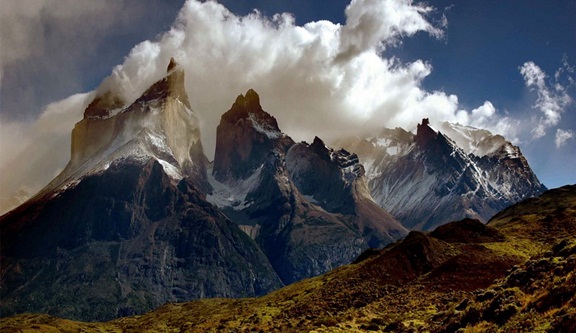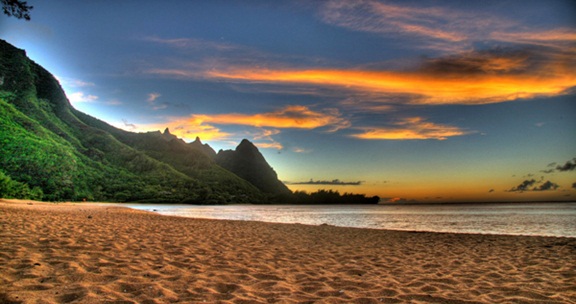In India, the birthday of Dr. Sarvepally Radhakrishnan is celebrated as Teachers Day on September 5, every year. The second President and the first Vice President of India, he was a philosopher and an enlightened soul too. Teachers Day is celebrated to pay tribute to the teachers who ignite young minds with the light of knowledge. To think from broader perspectives, whoever or whatever or wherever we learn from during our journey from cradle to grave is a teacher. Mother Nature is a great teacher herself. Nature like a teacher inspires, motivates and enlightens us. IndianEagle pays tribute to nature on the eve of Teachers Day.
We were close to nature and away from material things in childhood. The floating clouds, the flying birds, the flowing streams, the blooming flowers, the blowing wind, the twinkling stars, the rising sun, the shining full moon, the rolling waves, the towering hills and the falling leaves – different forms of beauty – connect children with nature. Innocent minds are like innocent creatures in the world of nature. Nature teaches the value of innocence and gives lessons on the same. The divine beauty of nature is visible only to the innocent. Childhood, innocence, beauty and happiness are intermingled with each other in the nature poems of William Wordsworth, a great admirer, lover and worshiper of nature. The following quotes from two of his poems – My Heart Leaps Up and Daffodils – bear out to the observation above:
“My heart leaps up when I behold
A rainbow in the sky”:
“I wandered lonely as a cloud
That floats on high o’er vales and hills,”
Nature manifests its edifying self to us at different points of our journey from childhood to adulthood. Nature, the greatest force in the universe, reveals its abstract power in different concrete forms – mountains, rocks, oceans, rivers, trees, etc. Mountains, hills and rocks teach us the value of determination as well as resolution. They have been standing tall for ages. Their steadfast position is a lesson on how to stand ground for the right and against the wrong. We learn from them to live with our heads held high.
The human mind is as deep and mysterious as an ocean. Love, joy, kindness and mercy reside in the abyss of the heart just as pearls are found in the bottomless pit of oceans. Like the wavy surface of seas, we are eloquent outside. The true bliss of peace springs from our inner selves just as water bodies are clam in the deep. The journey of a river from the source to the destination is a lesson on how to brave odds by means of willpower in life. The tempo of human life never ceases even in the face of adversity, just as rivers stop at nothing on their way.
There are lessons to learn from small artifices of nature, too. Flowers that spread fragrance in their surrounding teach us to spread love unconditionally. Trees give us lessons on how to exist despite unfavorable circumstances. As we grow and age, our innocence is replaced by experience. Such natural phenomenon as scorching summer, biting winter, rainfall and blows of wind make us feel that we are human beings of flesh & blood and that we exist. To be precise, the extreme forces of nature give us lessons on adversity and teach us how to survive. The following quotation from William Shakespeare’s As You Like It better illustrates this edifying aspect of nature:
The seasons’ difference, as the icy fang
And churlish chiding of the winter’s wind,
Which, when it bites and blows upon my body,
Even till I shrink with cold, I smile and say
“This is no flattery: these are counsellors
That feelingly persuade me what I am.”
It is the world of nature where we take flight to from the monotony of day-to-day life. Travel to hill stations and seaside destinations lends us a new lease of life through rejuvenation of the body, the mind, the soul and the senses. If there were no retreat to nature, we would have been going round in the circle of toils and moils. The mundane world is full of struggle, conflicts and hardships. Travel to nature is the best escape, though temporary, from such grim slices of life as boredom. It revives our energy and enthusiasm. It blesses us with peace and joy. In As You Like It, William Shakespeare throws light on the benefit of moving to nature away from society:
And this our life exempt from public haunt
Finds tongues in trees, books in the running brooks,
Sermons in stones and good in everything.
I would not change it.
Since the time immemorial, nature has been a source of enlightenment in India, and travel has been the way to achieve it. Swami Vivekananda, the greatest disciple of Ramkrishna Paramhansa, is the name that comes to the mind when we speak of nature’s enlightening power. His tour of India (Bharat Bhraman) had culminated at Kanyakumari, the southernmost point of the country, where he sat on a rock, meditated, visualized the future of India and achieved enlightenment. Also, Gautama Buddha and Mahavira belong to the same brigade of travelers in quest of knowledge and truth.
If we leaf through the pages of history, we will find that not only monks but also mighty kings lived in forested areas and meditated in search of eternal happiness, at the twilight stage of their lives. Since the early age of human civilization on earth, nature has been inspiring the imaginative minds to indulge in the pursuit of discovery, invention and creativity. The beauty of hills, seas, waterfalls, lakes and the starry sky has been the Muse to poets and painters. Travel is the best tribute to Nature, the mightiest teacher of the universe. We at Indian Eagle would like to conclude with a famous quote by William Wordsworth:
“Come forth into the light of things, let nature be your teacher.”










